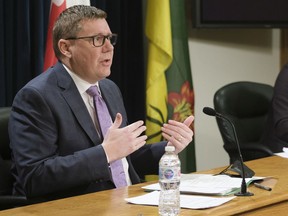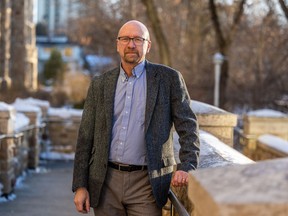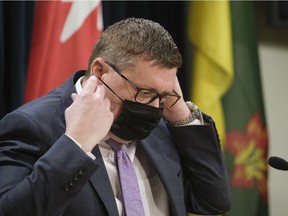Experts said Moe based his claims on a partial, truncated set of data that public health science does not consider useful.
Author of the article: Zak Vescera
Publishing date: Feb 01, 2022

Saskatchewan Premier Scott Moe isn’t budging from false claims that COVID-19 vaccines are not reducing risk of infection or transmission of the Omicron variant.
Moe said Monday that while the shots prevent hospitalization, he does not believe they prevent infection or transmission.
Public health experts, virologists and infectious disease doctors were quick to say that’s not true based on the best available science.
Moe’s office said his comments stand and are supported by data from Saskatchewan’s COVID-19 testing.
Dr. Cordell Neudorf, the Saskatchewan Health Authority’s acting senior medical health officer, said the data Moe references is partial, biased and not useful for making any conclusion about vaccine efficiency

“There’s all kinds of problems with the data that he’s using,” Neudorf said.
“We both agree this vaccine is far less effective against transmission than previous variants, but it still has enough impact that we need to be strenuously supporting it and encouraging people to get immunized.”
MOE’S REASONING
Imagine two hypothetical groups of Saskatchewan people, identical except one is vaccinated and the other is not.
In theory, COVID-19 case rates in those groups would give policymakers an idea of whether the vaccine is holding up. That appears to be the assumption Moe made about Saskatchewan’s PCR testing data.
The past week of results show vaccinated people are more likely to test positive. Moe made the conclusion while announcing details about plans to scrap Saskatchewan’s proof of vaccination system, which he argued was no longer preventing transmission.
“What the data is saying, ultimately, is that the infection rate we have, the new cases we have in this province, are roughly about the same in vaccinated and unvaccinated people,” Moe said.
“For anyone to say differently, it’s frankly not the case.”

In reality, however, the PCR data Moe cited is no longer a true reflection of how COVID-19 is spreading in the community, Neudorf noted.
Overwhelming demand for testing prompted the government to restrict PCR testing to people with worsening COVID-19 symptoms, health-care workers, people going into long-term care or acute care settings, those who are part of a declared outbreak and those who are immunocompromised. People with no or few symptoms are asked to use rapid antigen tests; their results are not reported to or recorded by the government.
Neudorf said many of the groups prioritized for PCR testing are much more likely to be vaccinated but also more likely to get sick by virtue of age, medical vulnerability or being part of a confirmed outbreak.
“Increasingly, from a public health perspective, we’re not even able to use that case data very much now because it’s so truncated,” Neudorf said.
Together with the very short timeline of one week, he said the sample is so biased that the data can’t be used to make any determination about how effective a vaccine is.
“You’re already biasing your sample in terms of people who have higher immunization rates and people who are most vulnerable to getting sick.”
The cohort example also only works if vaccinated and unvaccinated Saskatchewan residents are equally likely to seek PCR testing

University of Saskatchewan epidemiology professor Dr. Nazeem Muhajarine said he is not convinced that’s true. He has spent more than a year polling Saskatchewan residents and noted unvaccinated people, by and large, don’t report seeing COVID-19 as a risk.
“Moe’s statement that the vaccine isn’t protecting doesn’t hold any water. It is skewing the data, and really trying to tell a particular story or narrative that ‘now we can move on,’ ” Muhajarine said.
NDP Opposition Leader Ryan Meili said Moe twisted facts to justify decisions to drop restrictions.
“There will come a day where COVID-19 will be endemic, and if I could make that day today I would do it in a heartbeat. But that day is not today,” Meili said.
WHAT THE SCIENCE SAYS
A growing body of scientific research agrees Omicron evades vaccine immunity better than its predecessors, but vaccinated people are still more protected from infection — especially with a third dose — and are also less likely to transmit the virus to other people.
A recent Toronto study found people with just two doses had decreased immunity against Omicron compared to Delta — but a week after a booster dose, protection against symptomatic infection shot up to more than 60 per cent.
“A lot of vaccines that we have before COVID, if you get 60 per cent, that’s very decent. Some influenza vaccines are lower than that in terms of preventing infection,” Muhajarine said.
Dr. Angela Rasmussen, a virologist at the U of S’s Vaccine and Infectious Disease Organization, said studies in multiple countries show existing vaccines still protect against infection, transmission and severe outcomes. Those studies take steps to control or account for external factors and have delivered consistent results, creating a strong set of data that vaccines are still helping against Omicron.

“I think what the public is confused by is this is being presented by the premier as an issue of absolutes — vaccines prevent infection or they don’t. And nothing works that way with the immune system,” Rasmussen said on Monday.
“What’s really disappointing to me about this statement is really that these statements are things that the anti-vaccine movement relies upon. They take the truth about vaccines and they twist them to make it seem as if vaccines are not having any effect, and may even be dangerous.”
Neudorf said he wants politicians and public health officials to get back on the same team by promoting vaccination and all of its benefits.
“This war of statistics is not helping things.”
Sask. Medical Association disappointed, alarmed by premier’s comments
On Tuesday, the Saskatchewan Medical Association (SMA) put out a news release basically shaking its head at Premier Scott Moe and urging him to reconsider recent decisions and remarks.
On the weekend, the premier promised to remove the COVID-19 vaccination or test mandate, and on Monday he doubled down on that position, saying it could happen before the end of February.
In its statement, the SMA said doctors are disappointed and alarmed by the premier’s statements, and asked the government to continue on with current restrictions. The association also took issue with Moe’s statements claiming the COVID vaccine doesn’t protect against the spread of the currently dominant Omicron variant.
“The premier’s statements continue to ignore the advice of medical experts at a time when COVID-19 hospitalizations have reached their highest levels since the start of the pandemic,” wrote Dr. Eben Strydom, president of the SMA.
“It shows no empathy for the thousands of health-care workers who are bearing the unrelenting weight of caring for such high volumes of COVID-19 patients and the impact that has on other health services.”
Given that hospitalizations hit a pandemic high on Monday and then exceeded that mark Tuesday, Strydom said in a subsequent interview the premier’s comments couldn’t have come at a worse time.
“I think everybody’s tired of the COVID situation and would like to see a change, but at this stage, we have record numbers of hospitalizations — luckily ICU numbers are not as bad — but we’re not out of the woods yet and we are concerned that people might get the idea that we are,” said Strydom.
Strydom said there were inaccuracies that Moe was putting forth about vaccines, specifically that vaccines don’t help prevent a person getting COVID.
“I think the data is clear that vaccines do prevent infection with Omicron, and thereby reduce the chances of spreading it,” said Strydom.
Vaccination is about 90 per cent effective at reducing the severity of COVID illness, and about 60 per cent effective at preventing symptomatic infection with the third dose, according to the association.
Strydom conceded vaccines are not 100 per cent effective, but that’s why other measures like distancing, masking and hand washing have been used to reduce risk.
On Monday, Moe said he’s just following the data when asked where he’s getting the information informing his statements and decisions around the vaccine policy. Strydom said he hasn’t seen the data Moe was referencing, but he would like to see it published publicly to create a more transparent approach.
“All of us want to see the end of this pandemic. We can’t wait for that day, but that day is not now. And we need to be careful otherwise we’ll end up in the same situation that we were in the fourth wave with numbers that paralyze our system,” said Strydom.
In the statement, Strydom said the government should only consider lifting measures when COVID cases are steadily declining, when hospitalizations are down to the low double-digits, and when there are fewer than 10 people with COVID in the ICU.
“Rather than picking an arbitrary date for changing public health measures, the government should use clear goals and targets as the triggers. Physicians expect and citizens deserve government decisions be based on sound medical science, not personal preference or political expediency,” Strydom said in the statement.
Other doctors have said they feel there’s a disconnect between the messages the government is sending and what’s really happening in health care. Strydom agreed there is some tension and called it unfortunate.
“We would like to have a more collective and collaborative approach to make it better,” said Strydom.
The doctor said with something like this, it’s important they’re all on the same page because everyone wants the same outcome — to protect patients, health-care capacity and the economy, and to go on with life.
No comments:
Post a Comment